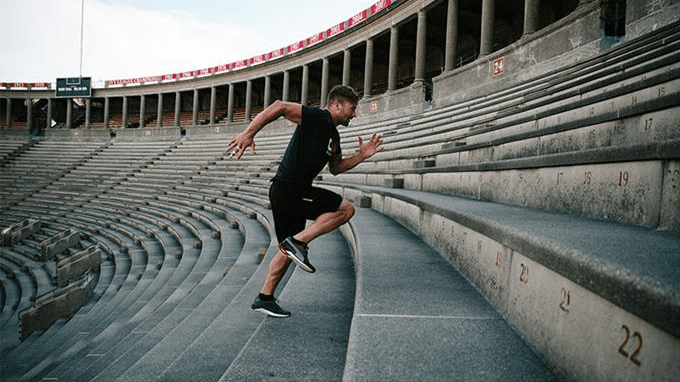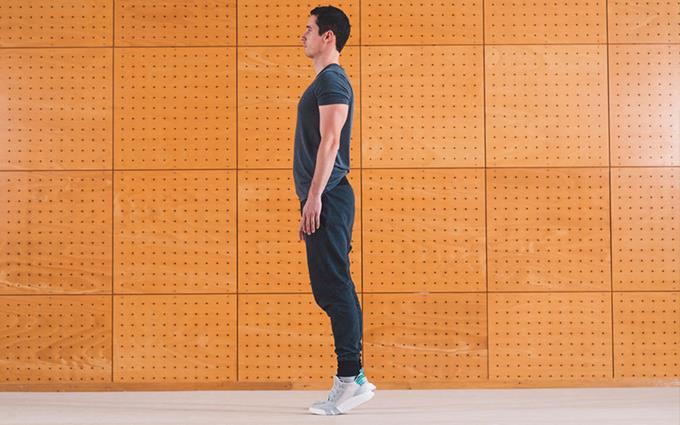Increasing your quickness, agility, power, and vertical jump will undoubtedly make you a dominant competitor.
For an athlete to become elite, the first thing he or she must do is build up their body. This all starts with the posterior chain (aka, the backside of your body). There are many ways to attack the posterior chain, but when playing a sport like basketball, your focus has to be on muscular endurance and not a huge emphasis on overall strength.
In basketball (and many other sports), there are a lot of quick movements, accelerations, cutting, jumping, etc. Therefore, you want to do exercises that will not only make you stronger, but will also give you endurance, agility, and power.
Work these four simple exercises into your training–they will separate you from the competition, and take your game to Another Level™.
1.) Running Stairs
Strengthen your lower body for power!
Ideally, you would like a set of stairs of at least 15 steps or you can use bleachers or semi-steep hills. The object is to treat your stair workout as if you were doing intervals, which you are essentially doing. Whenever you run up the stairs at a certain speed and against gravity, and then come back down at lower speed without the effects of gravity, you are doing interval training.
This type of training will spark your cardiovascular system and elevate your heart rate while strengthening your lower body due to the force of gravity. This is an excellent workout with many benefits.
After a 6-8 week stair climbing program, you will notice new strength and power in your legs. Try this workout 2-3 times a week for 6-8 weeks:
One-Step Program
Run up the stairs taking each step at a moderate to fast pace, making sure to pump your knees, then jog back down slower than you went up each step at a time. Each up and down is one rep and repeat for 10 reps. As you progress, add in two more reps each week – which should have you at 20 reps in 5 weeks.
Skip-Step Program (Advanced)
Run up the stairs at a moderate to fast pace skipping one step at a time, then jog back down slowly one step at a time. Each up and down is one rep and repeat for five reps. Each week, you’ll add one more rep. This exercise is advanced, so you should be experienced in running up one step at a time before you try skipping a step.
There are many variations you can add to the stair climbing workout, such as lateral climbing, 2 foot hops, jump squats, etc.,. These varieties can be added later as you become more advanced.
2.) Jumping Rope
Become quicker and increase your vertical leap!
Jumping rope must be done with many reps or in a certain time frame, because your body needs to start getting fatigued before jumping rope becomes effective.
It’s sort of like running distance for endurance. You can’t run for 1 or 2 minutes a day and expect to see results. The objective is to run more and more so you can build up your endurance and body strength. This is the same for jumping rope. The goal is to jump for longer and to do different jumps that work different muscles.
Here’s my recommendation for a 6-8 week jumping rope program:
Do regular two-foot jumps starting off at 30 second intervals (or 50 jumps). Each week you will add 15 seconds of time or you can add 25 jumps. In 6 weeks, you should be able to jump nonstop for 2 minutes or complete 200 jumps.
Using a basketball court or similar surface, you will do what we call “the running jump up and down the court” – this is when you jump as you run. So with each running step, you will also be jumping over the rope, and every time you go down the full court and back, it’s one rep.
Start off doing five reps. Each week, add in one more rep. You should be at 11 reps in 6 weeks.
3.) Lunges
Great for explosiveness and power!
In order to be explosive and powerful, you can’t just have strong lower body and core, you must also have good balance.
Lunges do all these things. Lunges are unilateral exercises, meaning that they train one side of your body independently from the other. This in return helps your balance while makes you explosive and powerful at the same time.
Lunges will activate your glutes and your core, which are vital for producing power. Lunges are right up there with squats in regards to power production and increase your vertical jump. Additionally, lunges are an excellent exercise for the young athlete, as they are safer than weighted squats, and you can do them anywhere.
Lunges can be done standing in one place or it can be done as a power walk. You can use weights such as carrying dumbbells in each hand or you can use a barbell and hold it at the top of your back.
Here is some tips on how to do lunges correctly in a 6-8 week beginner’s workout:
Keep your upper body straight, with your shoulders back and relaxed and chin up (pick a point in front of you to stare at so you don’t keep looking down). Always engage your core.
Step forward with one leg, lowering your hips until both knees are bent at about a 90-degree angle.
Start off doing six reps of lunges on each leg for three sets. You can stand in place or do a power walk. Each week you are to add two reps per leg, putting you at 18 lunges per leg in 6 weeks.
Add 10-15 lb. dumbbells to each arm as you do lunges. 10 reps each leg for 3 sets. You can add 1-2 reps to each leg or you can increase the weight of the dumbbell each week completed.
4.) Calf Raises
Good for stability and balance!
Your calf muscles are vital to your sport performance. These muscles are your stabilizers and are essential for balance. Every time you flex your foot when walking, running, jumping, or planting, your calf muscles are working. The calf is made up of two muscles, the gastrocnemius and soleus. These two muscles work in tandem every time you flex your foot. Both muscles require strength in order to handle the load placed on them and to transfer power to and from the ground.
Calf Raises can be performed almost anywhere with either your body weight, barbells or dumbbells. I suggest to start off using your own body weight until your calves become stronger. Plus, using your own body weight will allow for a lot of repetitions, which is needed in order to strengthen the calves. My 6-8 week calf workout routine will surely blast your calves into overdrive, so you can dominate on the court or field.
Two-Legged Calf Raise
Find a wall or you can use some steps. Stand straight up with your feet flat on the ground and both hands flat on the wall like when doing a wall push up. When doing calf raises on the stairs, you can have your heel hanging off the stairs which adds greater range to the stretch.
To start your set, raise both your heels as high as possible, flexing the ankles while keeping the knees straight. Once your heel has reached it’s peak, you will lower the heel back to the ground, then immediately repeat the sequence again. Each time you go up and back down, it’s counted as one rep. Make sure you do not bounce, jump, or bend your knees.
One-Legged Calf Raise
The one-legged calf raise is performed the same way as doing the two-legged, except now you will stand on one leg as you raise your heel up and back down. You can start with either the right or left leg as long as each calf gets the same numbers of repetitions. Again, do not bounce, jump, or bend your knees!
Here’s the cadence:
- Week 1-3: Start off doing 25 calf raises for 3 sets at 2-3 days. Each week after week 1, increase your calf raises by 10 reps which should have you at 45 reps for 3 sets by week 3.
- Week 4-6: Alternate each workout by doing both one-legged and two-legged raises (still increase by 10 reps each week if possible). When doing single calf raises, do 3 sets of 12-15 reps each leg, increasing each leg by 3-5 reps each week. So if you did calf raises with both calves at the same time for one workout, then the next workout you would only do single legs.
- Week 6-8: In succession, you will do calf raises with both legs 25-30 reps, immediately followed by single leg calf raises 12-15 reps. This advanced workout is a lot harder and will definitely fatigue your calves. Perform 3 sets 2-3 days a week. One set is only accounted for once you have done both calves at the same time followed by single leg calf raises. Increase your reps accordingly. I also recommend that you stretch your calves out either between sets or after your completion of all working sets.
Good luck on your journey to becoming an elite athlete and great basketball player. It will take a lot of hard work and practice. However, if you include in your regular practice routine these four exercises and workouts written here, you will surely become quicker, more agile, more powerful, and you’ll jump higher! Accordingly, we can not ignore the importance of push ups and pull ups which are also game changers – so work those into your routine as well!
Coach Dell Johnson
www.coachup.com/coaches/dellj
Instagram-coachupdellj4488
Twitter-@DellJCoachup
CoachUp is the safest and easiest way to find a coach for personalized training. With our 100% money-back guarantee and vetted coaches, anyone can achieve their full athletic potential. Find your perfect coach today and become the athlete you want to be!
How useful was this post?
Click on a star to rate it!
Average rating 4.7 / 5. Vote count: 31
No votes so far! Be the first to rate this post.









2 Responses
Good information
Thank you
Great recommendations. I use jump roping in my own workouts for maintaining my vertical and it works really well for workout days with lower intensity.